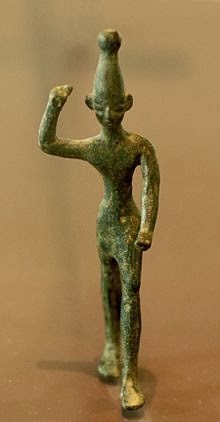1. A significant amount of time had passed from the prior miracles. God's timing is wholly His.
2. The Lord provides a bit of a buffer with Obadiah.
3. Even Obadiah's first reaction is "how did I sin" to deserve this task.
4. I think this is Obadiah, the prophet? If so, interesting that God put him in charge of Ahab's
 |
| Ba'al with raised arm, 14th-12th century BC, found at Ras Shamra (ancient Ugarit),Louvre |
4. Elijah doesn't take any junk. When Ahab greets Elijah with the question: "Is that you, destroyer of Israel," Elijah corrects and points to Ahab's own sin quite directly.
5. 1 Kings 18:21 is worth some consideration. How much easier it is to sit between a truth and a lie than to decidedly chose the truth.
6. Clearly, God does not delight in self-abuse or the dark kind of notions about hurting ourselves to prove our devotion to Him.
7. Dramatic signs are not always immediate--they had to look 7 times for the cloud before they saw it.
8. What a picture! Elijah girds up his garment and beats Ahab back to the city. Although interesting, I'm not entirely sure of the significance.
love this from the Biblical Illustrator--encourages me that we all have possibilities despite our areas of struggle:
"In the same character may be met great faith and great doubt. Obadiah risked his life to save fifty of the prophets of the Lord, yet dare not risk it, without first receiving an oath, for the greatest prophet of all! This mixture we find in every human character. “How abject, how august is man!” In Ahab, Obadiah, Elijah, and Jezebel, we see a fourfold type of human society; there is the speculator, the godly servant, the far-seeing prophet, the cruel persecutor. Society has got no further than this to-day. O wondrous combination! So checked, so controlled, by invisible but benignant power. Speculative error has its counterpart in actual cruelty, and patient worship has its counterpart in daring service. Application.
(1) Be the servant of the Lord.
(2) To-day, Christ calls for faithful testimony;
(3) If we suffer with Christ we shall also reign with Him." (J. Parker, D. D.)
Felix Mendelssohn, a German composer, wrote an oratorio centered around the life of Elijah in 1846. The music reflects a mix of Baroque and Romantic influences:
Regarding Baal and False Gods:
 |
| Elijah on Mt. Carmel, Dura Europas synagogue, c 245 |
On Truth
For Grace, who struggles with the idea of truth and justice not being the norm in this present world. Truth is often the prerogative of the minority:
"1. We are reminded of the great disparity between these opposing forces. Now, as then, Truth is in the minority. It was one man against four hundred and fifty. But so it is always. The world has never seen a popular majority for the truth. Only eight souls were saved in the ark; Abraham was alone in his faith; Israel was but a handful; and the “peculiar peoples” in every age have been “a remnant.” Even the Son of God did not restore the equilibrium. The Reformation effected but a partial equalisation. The present age of missions, with all its conquests, finds the Church outnumbered in every region by its foes. Not only so, but in respect to earthly rank, power, prestige, the advantage has always been on the side of error. If at intervals the tide seems to turn, as when David, Solomon, Constantine give to religious truth political pre-eminence, such episodes are transient, and soon the old disproportion returns.
Truth for ever on the scaffold,
Wrong for ever on the throne,
abides as the rule obtaining in every age for the fortunes of the kingdom of heaven on earth."
-CJ Baldwin, BI
 |
| The Rival Sacrifices of Elijah and the Priests of Ba'al, Lucas the Younger Cranach, 1645 German Renaissance artist |

No comments:
Post a Comment